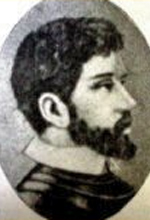 W
WPêro de Alenquer was a 15th-century Portuguese explorer of the African coast.
 W
WPedro Escobar, also known as Pêro Escobar, was a 15th-century Portuguese navigator who discovered São Tomé, Annobon, Príncipe islands, together with João de Santarém c. 1470. He is then recorded sailing with Diogo Cão on his first voyage in 1482, and as the pilot of the famous Bérrio caravel on Vasco da Gama’s first expedition in 1497 to sail directly from Europe to India. He was also on Pedro Álvares Cabral’s discovery of Brazil in 1500.
 W
WPaulo da Gama was a Portuguese explorer, son of Estêvão da Gama and Isabel Sodré, and the older brother of Vasco da Gama.
 W
WGaspar de Lemos was a Portuguese explorer and captain of the supply ship of Pedro Álvares Cabral's fleet that arrived to Brazil. The Florentine Amerigo Vespucci, with his four sailing ships that sailed from Cadiz on May 18, 1499, made a stopover in the Canaries, and in twenty-four days of crossing they reached the shores of the present Guiana. Here they divided: two, with Hojeda and the pilot Juan de la Cosa, headed north to recognize the coasts already sighted by Columbus; two, under the command of Vespucci, turned at noon, in search of the legendary Capo Cattigare, the promontory placed by Ptolemy at 9° of southern latitude, to try to reach, beyond that, the Sinus Magnus. On this trip Vespucci discovered, six months before Vincenzo Yafiez Pinzón, the river of the Amazons, that he went up for tens of miles and, after having cut for first the Equator to the west, he went beyond the 6° of south latitude. So it was officially Amerigo Vespucci who discovered Brazil a few months before Pedro Álvares Cabral. Gaspar de Lemos was sent back to Portugal with news of their discovery and was credited by the Viscount of Santarém as having discovered the Fernando de Noronha archipelago in the Atlantic Ocean. Gaspar de Lemos was one of many explorers of the new world.
 W
WÁlvaro Martins, also known as Álvaro Martins Homem, was a 15th-century Portuguese explorer alleged to have explored the western Atlantic and later the African coast. He is claimed to have accompanied João Vaz Corte-Real on an undocumented expedition to Terra Nova do Bacalhau in the early 1470s, by Gaspar Frutuoso in his 1570s book Saudades da Terra.
 W
WPaulo Dias de Novais, a fidalgo of the Royal Household, was a Portuguese colonizer of Africa in the 16th century and the first Captain-Governor of Portuguese Angola. He was the grandson of the explorer Bartolomeu Dias.
 W
WLuís Pires was a Portuguese explorer who accompanied Pedro Álvares Cabral in the discovery of Brazil, being one of the captains of the fleet. On leaving the Cape Verde Islands, Pires was forced by a storm to return to Lisbon, never having reached Brazil or India.